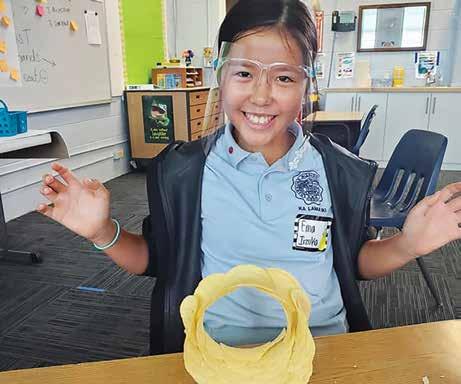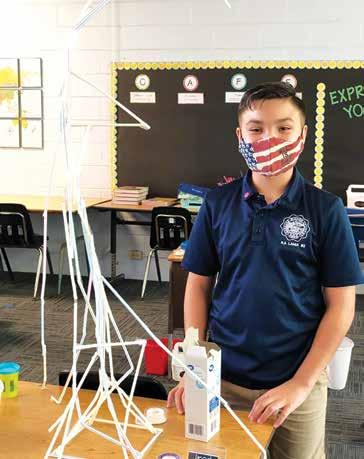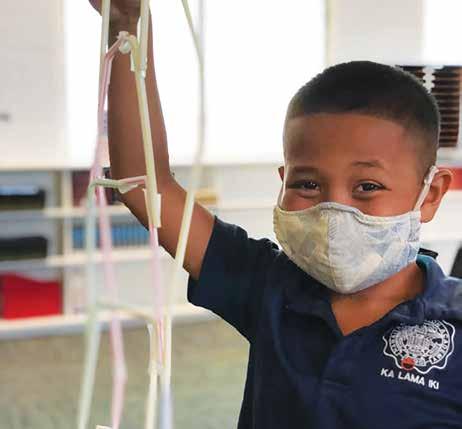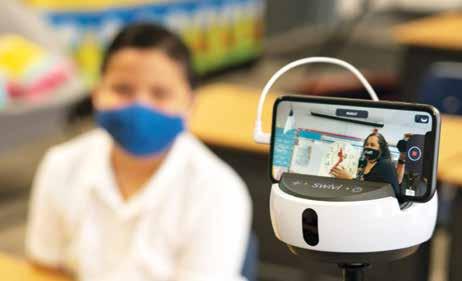
9 minute read
Newsdesk
Adventist Schools Adapt for New School Year
By Faith Hoyt, with contributions from Adventist educators in the Pacific Union
Though the restrictions due to coronavirus have lasted longer than many anticipated, Adventist schools in the Pacific Southwest have adapted in order to continue providing quality education. Schools have prepared for a mix of both oncampus classes and virtual learning this school year and are addressing the needs of students for either option.
In Northern California, Rio Lindo Adventist Academy pivoted their recruitment procedures for new students. When faced with travel limitations and access to campus, Rio launched a "Virtual Visitation" section on their website to welcome prospective families and give a taste of campus life. The Virtual Visit includes a school tour video and a chance to schedule a live information session with the enrollment team. At the time this article was written, Rio planned on opening with in-person instruction, but they are ready to do distance learning if needed in light of COVID restrictions for schools. "This moment in time is one of the most challenging seasons for many of our Adventist schools," says Rika Meyer, vice principal for marketing, enrollment, and development. "We have to be innovative and adaptable in the face of adversity, but this is also the time that we can find opportunities that we didn't even
Students at the Ka Lama Iki campus of Hawaiian Mission Academy participate in STEM icebreakers with their class during their first day back to school on Aug. 3. “We couldn't be prouder of our students for tackling this big day safely!” the school shared on social media.
In Southeastern California, the with both in-class and off-campus local conference office of education students. Additionally, Swivl posts equipped schools with a Swivl recorded lessons to an on-demand robot system that uses a tablet as online database where students can a video camera. The Swivl robot review them later. senses an infrared marker that the One of the schools to receive teacher wears on a lanyard, and the the Swivl robot system is La Sierra robot “swivels” to follow the marker Academy. "We believe we can wherever it moves in the classroom. provide synchronous learning Additionally, microphones for the for our students who choose to instructor and throughout the remain home but still have an classroom ensure that every student Adventist Christian education," is heard. The Swivl system will allow shared Elizabeth Muñoz Beard, head

principal of the academy.
At Loma Linda Academy, a summer of preparation for the school year has enabled the academy to offer students a hi-flex option.
The back-to-school page on the LLA website covers guidelines for campus access, physical distancing, hygiene procedures, and distance learning in the event of another stayat-home order.
Adventist schools in Nevada and Utah have created reopening plans that follow Continued on page 60


Continued from page 59 local, state, and federal recommendations for in-person instruction, while also accommodating the option for remote instruction.
“The Nevada-Utah Conference has equipped most of the schools with the technology to broadcast classes live,” shared Fernando Lista, superintendent of education for the NUC.
School reopening plans for NUC schools address the guidelines for such safety aspects as physical distancing, mask wearing, health screenings, and meals eaten on campus.
In Hawaii, schools opened for on-campus instruction on Monday, Aug. 3. In preparation for their opening, teachers at the Ka Lama Iki campus of Hawaiian Mission Academy filmed a back-to-school video demonstrating their new of the Pacific Union Conference, a regulation protecting job applicants was recently passed. drop-off and pick-up procedure for parents, as well as showing the safety precautions in place so that students can maintain social distance while participating in on
PHOTO: ENNO MÜLLER campus learning.

La Sierra Academy is one of the schools to receive Swivl robot systems for their classrooms from the Southeastern California Conference Office of Education. The Swivl system allows teachers to interact simultaneously
Advocacy Leads to Legislation: New California Regulation Protects Job Applicants
By Alan Reinach
After several years of advocacy by the Church State Council, the religious liberty ministry
with both in-class and off-campus students.
While it has long been illegal to screen out job applicants because of their race or their religion, for example, questions about schedule availability have routinely been used to reject applicants who don’t work certain days on account of their religion, especially Sabbath observers.
Effective July 1st, a new regulation went into effect in California that protects employees filling out job applications from disclosing scheduling restrictions based

New California Regulation Protects Job Applicants
THE REGULATION DECLARES: Such inquiries must clearly communicate that an employee need not disclose any scheduling restrictions based on legally protected grounds, in language such as: “Other than time off for reasons related to your religion, a disability, or a medical condition, are there any days or times when you are unavailable to work?” or “Other than time off for reasons related to your religion, a disability, or a medical condition, are you available to work the proposed schedule?”
on legally protected grounds. It codifies the law against just such discriminatory practices by requiring employers to place a notice, on the job application itself, that the applicant should not indicate if they are unavailable due to religion, medical condition, or disability.
Instead of having to check off that the applicant is unavailable, they can answer as though they are available to work. Only after a job is offered, and the employer communicates the work schedule, will the employee need to seek a religious accommodation for Sabbath observance.
Those applying for jobs are urged to take note and send copies of any offending job applications to the Church State Council. The Council is committed to educating employers and enforcing the provisions of this regulation it fought so hard to enact. You can reach the Church State Council by email: secretary@ churchstate.org; by phone: 805-413- 7396; or online at www.churchstate. org. The Council provides legal services to church members with Sabbath work conflicts—always at no cost to church members.
During such a time of economic distress, it is important to safeguard the opportunities of unemployed persons to be considered fairly when they apply for a job.
A Pillar in the Pandemic—Adventist Health Continues to Live God’s Love
By Yara Enamorado
Our calling as a faithbased organization is to live God’s love, to be His hands and feet. As the apostle John writes, “We love each other because he loved us first” (1 John 4:19, NLT). At Adventist Health, our value of “Be a force for good” leads us to take action in our community. We know God’s goodness and love, and in return we want to share that with others.
Throughout these months of global pandemic fear, anxiety, loss, and suffering, Adventist Health has had the opportunity to put into action our mission of living God’s love in the most unique and trying of circumstances. It’s through God’s grace and mercy that we can testify to His work through us as a system.
Our hospitals serve thousands of patients every day. Continual safety measures remain a top priority, as is reminding and reassuring our community that our hospitals are safe and ready to serve them. But it doesn’t stop there. In addition to tirelessly caring for COVID-19 patients in California, Oregon, and Hawaii on the front lines of the pandemic, team members are going beyond the hospital walls to care for their communities.
In Southern California, for example, we are seeing daily blessings as our hospitals are both receiving and giving an abundance of support.
In Simi Valley, Adventist Health donated thousands of masks and gloves to the 140+ postal carriers in the community. Additionally, Adventist Health repurposed donated foods to put together over 260 goody bags, which they gave to the three post offices in Simi Valley. These essential frontline associates were thrilled and thankful for the support. Kathryn Stiles, director of community integration at Adventist Health Simi Valley, said, "We are blessed to live in a resilient and loving community. They have shown

Adventist Health White Memorial delivers food to the community of Boyle Heights.

an outpouring of support for the hospital and our associates, and in turn, we have been able to support many of our community nonprofits and other essential associates who are doing heroic things every day."
In Glendale, Adventist Health is leading a virtual programming initiative to reach out to seniors who are among the most affected by this pandemic and quarantine. From the start, Melissa Varraveto, senior community outreach associate, and her team made more than 1,500 phone calls to seniors in the Glendale community to provide comfort, support, and hope. They also aim to launch a variety of virtual programs from fitness classes to diabetes workshops. This is alongside their long-standing partnership with the Alzheimer’s Association, which will also offer virtual workshops.
To provide food security and wellness checks to the most vulnerable community members in Boyle Heights/East Los Angeles— seniors, homeless, undocumented men and women, and their families—Adventist Health White Memorial joined USC Keck, WELA YMCA, and volunteers in making thousands of telephonic wellness assessments to identify those in need of food or suffering from mental stress during self-isolation. Within the first week of this enterprise, 250 seniors were provided with a week’s worth of food. Since then, more than 100,000 deliveries have been made.
All of these stories reflect our associates’ living our mission of love. As Ellen White writes in Thoughts from the Mount of Blessing, “It is not earthly rank, nor birth, nor nationality, nor religious privilege, which proves that we are members of the family of God; it is love, a love that embraces all humanity” (p. 75).
Throughout California, Adventist Health and its partners have distributed more than 2 million pounds of food. We will continue to work and partner with organizations to bring relief and aid to those in need. Furthermore, as with the community, we are actively supporting our own associates and have disbursed over $855,000 in direct associate aid across our system.
The pandemic is not over. Although the rates of positive cases and hospitalizations fluctuate, we still have some time to go. Adventist Health will not cease to care for and love its neighbors. Global Missions System Lead John Schroer said he is proud of the work the Lord has done through our system. “It is truly inspiring to see the love and support Adventist Health is pouring into the community during this pandemic. We are committed now more than ever to respond to our communities’ needs and will continue to live God’s love by inspiring health, wholeness, and hope.”










